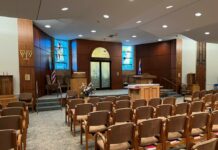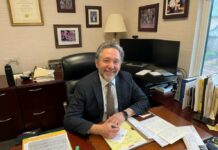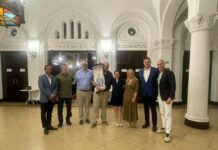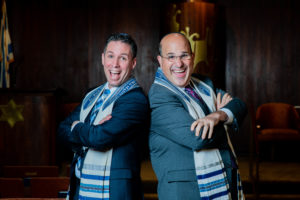
Temple Sholom in Broomall prides itself on openness, a tradition that goes back to Rabbi Mayer Selekman, who served the congregation from 1971 to 1999.
Selekman was one of the first rabbis in the area to officiate intermarriages, according to a successor at Temple Sholom, Rabbi Peter Rigler. And today, more than 20 years on from Selekman, openness at the Delaware County temple means more than just intermarriages, which, of course, continue.
Rigler’s Temple Sholom counts about 430 families in its congregation. But unlike many synagogues today, the Broomall building’s membership does not skew older. It ranges from newborns to 100-year-olds, the rabbi said.
During the pandemic, the temple’s doors even opened to people outside the Philadelphia area, according to Rigler. With the virtual option, service and program attendees now hail from Chicago, Boston and South Carolina, among other places.
“This is a dynamic, warm and welcoming place that’s not afraid of change,” Rigler said.
Rigler left one of the biggest and most well-known synagogues in the area, Congregation Keneseth Israel in Elkins Park, to come to Temple Sholom. He made that decision 12 years ago because he wanted to be a senior rabbi. But he also knew of the Broomall institution’s reputation under Selekman, and he wanted to continue the older rabbi’s legacy.
When Rigler walked in the door for his interview, he got a series of hugs from members of the search committee. At that moment, he felt that the openness was real.
“Rabbi Selekman,” he said. “He was ahead of his time, and people here weren’t afraid of that.”
Early in his tenure, Rigler learned that the hugs were not just some overly enthusiastic, first day of school-type gesture, either. That was the synagogue’s culture.
Warm and welcoming, willing to let Rigler lead. But also, perhaps more importantly, open to letting the new rabbi make his own stamp on Selekman’s institution.
He professionalized the staff to ensure that Temple Sholom’s programs were guided by people with the right skills; he started a social action program to take students to the southern United States to do hands-on work in different communities; he worked with education director Lori Green to build classes around project-based learning; he started working with synagogue parents and kids to make a 15-minute comedy video each year emphasizing High Holiday themes.
The rabbi was even ahead of the game in using the digital space. Temple Sholom began offering a virtual option for services about a decade ago.
The only difference that emerged during the pandemic was, instead of just streaming services, Rigler started engaging with those watching from a remote location.
“We realized a long time ago that one of the barriers to joining a synagogue was walking in the front door of the synagogue,” the rabbi said. “The Zoom world is the synagogue without walls.”
Now that the walls have transformed into bridges, Rigler wants to build them out even further.
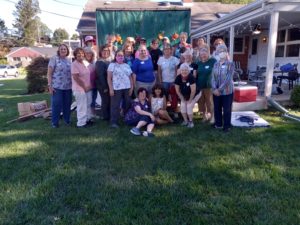
He said some older members have recently moved to King of Prussia but are still attending synagogue programs. The rabbi wants to continue the growth in opportunities in both the virtual and in-person spaces by adding more programs for specific constituency groups, as he described them.
A new men’s study group already has 25 people signed up, according to Rigler. Other similar groups will surely follow.
“We’re realizing that people are hungry for connections and meaningful connections to community,” he said. “It is the Temple Sholom spirit that this moment for us, while challenging for everyone, we were able to look at it as an opportunity and pivot toward our future.”
Before his interview at Temple Sholom all those years ago, the rabbi didn’t have his heart set on leaving KI. He just figured he’d take a look at Selekman’s old home, as he had heard good things.
After the hugs, the decision was easy — and he certainly doesn’t regret it now.
He also thinks he’s lived up to Selekman’s legacy.
Temple Sholom is still the same place it was then, just with some different programs and a whole new and modern dimension.
“We have a spirit of being warm and welcoming to interfaith families and diverse families,” he said. “That makes it a place where people want to find a home.” JE
[email protected]; 215-832-0740



